Best Church Website Builders Compared in 2026
In 2026, every parish needs a strong online presence — not just a social media page, but a proper home for sermons, donations, and community life. This guide compares the best church website builders, from Wix and WordPress to ChurchTrac and ShareFaith, exploring what makes each stand out. We’ll also look at the limits of templates and why many ministries choose Scrile Connect to create a fully custom church website that reflects their faith, brand, and long-term vision.
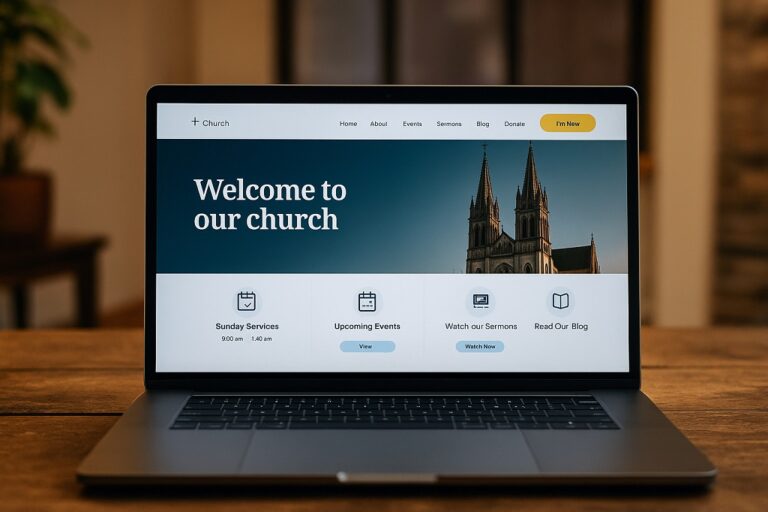
best church website builder
Churches have always been about connection — and in 2026, that connection happens online as much as it does in person. Livestreamed sermons, digital bulletins, and online donation tools are part of everyday ministry now. Even small parishes are realizing that a modern church needs a digital home just as much as a physical one.
Data backs it up. Statista reports that more than 70% of U.S. religious organizations already run some kind of website or app. Congregations use them to post updates, archive sermons, share event calendars, and welcome new visitors. It’s become the main way people find a church, not just a side project for volunteers with tech skills.
Finding the best church website builder is a practical task for pastors, staff, and community members who want something that lasts. A good website keeps information clear, payments secure, and online worship easy to access. It also helps new visitors understand what the community stands for — before they ever step inside.
This guide walks through the most trusted builders for 2026, explains what features matter most, and shows what happens when churches outgrow ready-made tools. At the end, you’ll see how Scrile Connect helps ministries build full-featured sites with design freedom, donation tools, and member management — all under their own name.
What to Look for in a Church Website Builder

A church website is no longer just a digital bulletin board. It’s the space where a community lives during the week. People look up Sunday’s sermon, donate to a local cause, or sign up for a choir event while waiting for a bus. The best church website builder isn’t about looks. It’s about staying reachable and functional without turning into another tech headache.
Churches have two constant limits — time and budget. So, builders that hide features behind upgrades or make you dig through endless menus rarely last. What works are tools that anyone can open, tweak, and publish with zero coding. The pastor. The volunteer. The youth leader with five minutes between classes.
A good ministry website builder should come with the essentials built in.
- Donations and tithing integrations. Stripe, PayPal, Tithe.ly — doesn’t matter which, as long as the flow feels natural and secure.
- Livestream and video hosting. Because some members just can’t make it to the pews every week.
- Event management and volunteer forms. Churches run on calendars, not chaos.
- Sermon blog and updates. A place to keep the conversation going after Sunday.
- Private access for members. Small groups, newsletters, prayer circles — the online version of community halls.
One overlooked thing? Mobile design. Half of your visitors will check your site from a phone, not a computer. If your donation form or stream buffer stumbles there, you lose them.
So, when we compare builders next, keep these pieces in mind. Simplicity. Price. Real support. That’s what actually makes one tool stand out from another.
Top 7 Church Website Builders Compared
Churches build websites for connection — to share sermons, post updates, collect donations, and stay close to their members. Choosing the best website builder for churches means finding a tool that’s simple, reliable, and strong enough to support that connection every day.
The builders below were compared by how easy they are to use, how well they handle media and events, and how flexible they are as a church grows. Price matters too, but what matters most is stability. When a site runs smoothly, people return. When updates take minutes instead of hours, volunteers actually keep it alive.
Here are seven options that church teams can trust in 2026 — tools that make it possible to run an active, welcoming online space without constant tech trouble.
1. Wix — Most Flexible for Beginners

Wix is one of the easiest options for churches that want to build a site quickly and manage it without outside help. Its visual editor works like stacking blocks — you drag, drop, and adjust until everything fits. Dozens of church and non-profit templates are ready to go, and every part of them can be customized.
It already includes tools most parishes need: online donations, event registration, sermon blogs, and livestream embedding. You can connect a custom domain or use the free one while the site is still in progress. Wix’s built-in analytics help track visitor activity, so even smaller teams can see which pages draw attention.
Pros
- Simple drag-and-drop interface
- 40+ faith-focused templates
- Optional free tier for testing
Cons
- Add-ons can increase monthly cost
- Limited export options if you switch platforms
Wix suits small and mid-sized congregations that need a polished site without developers or complex hosting setups.
2. Squarespace — Elegant Design and Ease of Use
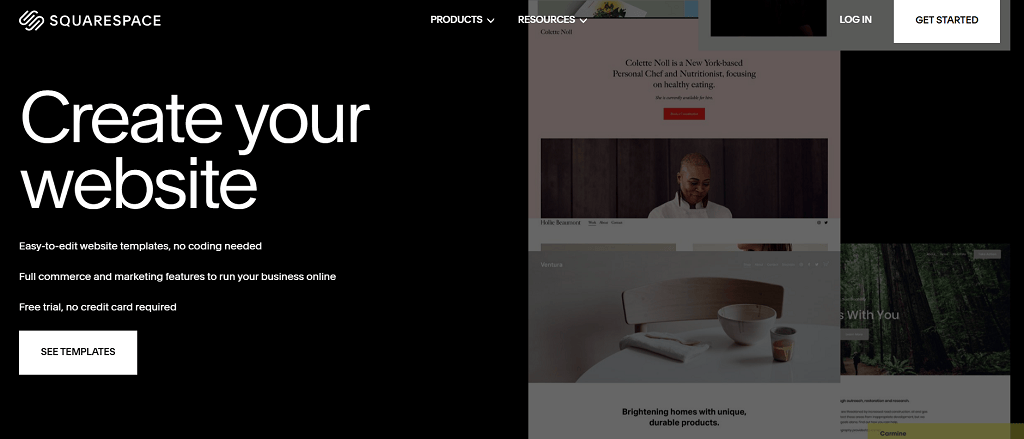
Squarespace stands out for design quality. Churches that want a clean, modern look tend to pick it because every template feels finished from the start. Fonts, spacing, and colors already look professional, so the site is ready to publish with minimal edits.
Beyond looks, Squarespace includes donation blocks, calendars, and podcast or sermon uploads. Everything adjusts automatically for mobile screens, and the hosting is handled by Squarespace itself, meaning no technical maintenance.
Pros
- High-quality templates that fit faith themes
- Reliable hosting and uptime
- Simple donation and event tools built in
Cons
- Fewer plugins than open systems like WordPress
- Slightly higher monthly price for advanced features
Squarespace is ideal for ministries that value presentation and want a platform that simply works once set up.
3. WordPress — Best for Scalable Church Websites
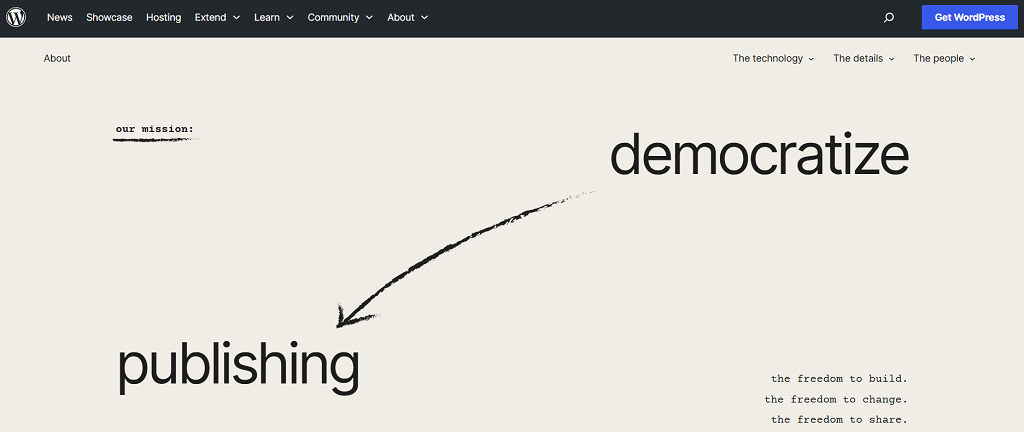
For larger ministries or tech-savvy volunteers, WordPress is often seen as the best church website builder for long-term growth. It gives you full control over hosting, layout, and features. The trade-off is that it takes a little more effort to learn, but once it’s set up, there’s almost nothing it can’t handle.
With the right plugins, churches can manage everything inside one dashboard. Tools like GiveWP handle donations, The Events Calendar manages weekly services, and Sermon Manager helps archive video or audio sermons for on-demand viewing. Themes built for ministries already exist, so you don’t have to start from scratch.
WordPress also scales easily — from a local church website with a few pages to a full network of campuses or ministries sharing content. Hosting costs vary, but the control you get over design and data makes it a favorite among developers and media teams.
Pros
- Huge library of themes and plugins
- Perfect for churches that want ownership of their data
- Can grow into any size or structure
Cons
- Requires updates and maintenance
- Slightly higher setup time
For churches that think ahead, WordPress remains one of the most reliable and best church website builder options in 2026.
4. The Church Co — Faith-Focused Solution

The Church Co was built specifically for faith communities. It’s not trying to serve everyone — it’s designed around the way ministries actually operate. That focus makes it a strong contender for the best church website builder title, especially for teams that don’t have technical staff.
Everything comes pre-configured for church life: sermon libraries, donation tools, live streaming integration, and podcast hosting. Admins can post upcoming events, manage small groups, and send updates straight from the dashboard.
Pros
- Tailored for ministry workflows
- Ready-to-use tools for sermons and giving
- Helpful customer support from church specialists
Cons
- Subscription model can limit smaller parishes
- Less design flexibility than open systems
If simplicity and mission-specific tools matter most, The Church Co keeps operations smooth and organized, helping small and mid-sized churches build strong digital routines.
5. ShareFaith — Content & Media Integration

ShareFaith is one of the best church website builder options for communities that rely heavily on visual media — sermons, Sunday School materials, and worship resources. It goes beyond basic web pages by blending content management with creative tools for presentations, devotionals, and newsletters.
One of its biggest strengths is the connection between the church website and the ShareFaith mobile app. Members can read devotionals, donate, or listen to sermons directly on their phones, all synced with the same admin panel. The system also helps larger ministries manage multiple media formats, which saves time for teams that upload weekly content.
Pricing varies by the bundle. You can choose website-only, or go for full access with video, media libraries, and app integration.
Pros
- Excellent media tools for sermon graphics and worship slides
- Integrated mobile app with giving and event features
- Designed for multi-campus and media-rich ministries
Cons
- Interface looks dated in some templates
- Full package pricing may be high for smaller churches
ShareFaith works best for churches that produce frequent multimedia content and want a single dashboard for everything — website, media, and mobile presence combined. For that reason, many still list it among the best church website builder tools of 2026.
6. ChurchTrac — Best for Member Management

While most website builders stop at design, ChurchTrac leans into church administration. It connects the public-facing website with internal tools for attendance, donation tracking, event scheduling, and member communication. This makes it one of the best church website builder solutions for churches that want both visibility and structure.
Instead of juggling multiple apps, staff can log into one system to manage finances, message members, and post updates to the main site. It’s ideal for pastors or admin volunteers who need to balance ministry with recordkeeping.
Pros
- Combines CMS with church management software
- Integrated donation tracking and messaging
- Affordable plans for small to mid-sized congregations
Cons
- Less focus on advanced web design
- Interface can feel businesslike, not creative
ChurchTrac isn’t flashy, but it’s practical. It’s built for communities that value order — the kind that need attendance logs, donor reports, and communication tools as much as they need sermon pages. Among admin-heavy parishes, it’s consistently praised as one of the best church website builder systems available.
7. Ministry Designs — Hands-On Support
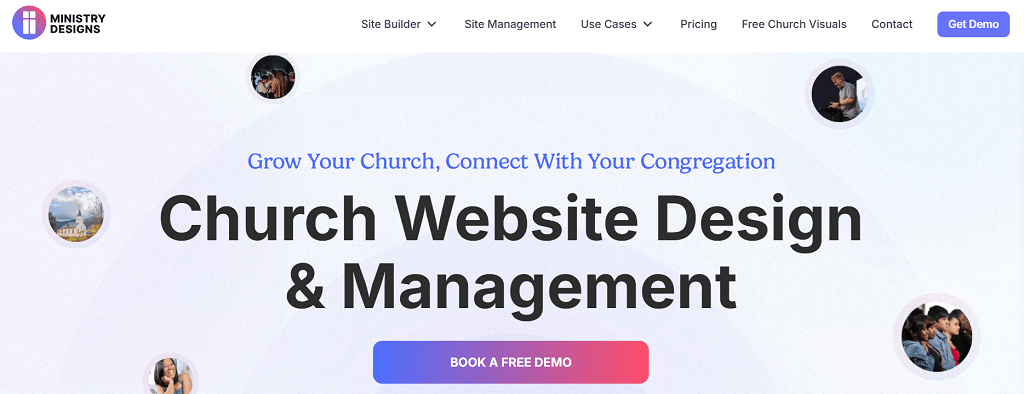
Ministry Designs doesn’t chase trends or try to reinvent how church websites look. What it really sells is support. When you sign up, a real person helps you build the first version of your site, walking you through every step — something rare among even the best church website builder tools.
It’s a cloud-based system that includes donations, event calendars, sermon uploads, and email tools. The interface is straightforward, and everything runs on their servers, so you don’t need extra hosting. Many small churches appreciate that it feels personal — you’re not left alone with templates and tutorials.
Pros
- Personal onboarding and live support
- Lifetime updates without extra fees
- Simple tools for donations and sermons
Cons
- Fewer modern design options
- Templates could use more flexibility
Ministry Designs works especially well for pastors or volunteers who have never managed a website before. Instead of dealing with plugins or hosting issues, they can focus on what matters — creating a space for faith and community online. That hands-on touch earns it a loyal place among the best church website builder options for beginners.
Comparison Table: Best Church Website Builders 2026
| Builder | Best For | Ease of Use | Key Features | Starting Price | Notable Limitation |
| Wix | Beginners & small churches | ★★★★★ | Drag-and-drop, 40+ templates, events & donations | From $16/mo | Limited scalability |
| Squarespace | Design-focused ministries | ★★★★☆ | Elegant layouts, donation pages, calendars | From $20/mo | Less flexibility with plugins |
| WordPress | Scalable, feature-rich sites | ★★★☆☆ | Full control, 1000+ plugins | From $5/mo + hosting | Steeper learning curve |
| The Church Co | Faith-focused organizations | ★★★★☆ | Built-in sermons, podcast hosting | $29/mo | Fewer design options |
| ShareFaith | Media-heavy ministries | ★★★★☆ | Media library, app sync, donation tools | $45/mo | Outdated UI |
| ChurchTrac | Admin-heavy parishes | ★★★☆☆ | Attendance, donations, internal messaging | $12/mo | Limited design freedom |
| Ministry Designs | Small teams & beginners | ★★★★☆ | Personal onboarding, updates included | $37/mo | Simple templates |
The Limits of Ready-Made Builders
Even the best church website builders have their walls. Templates promise simplicity, but they often make every parish look the same — different messages, same structure. When a community tries to grow beyond basic layouts, it quickly finds that plug-ins and upgrades don’t always cooperate.
Most website builders keep donations and membership tools inside their own ecosystem. That means limited access to donor data, no control over transaction fees, and few ways to connect with members outside built-in mailing tools. For small parishes, that might work fine. For a growing congregation, it becomes a bottleneck.
Another issue comes with features that define modern church life — livestreams, hybrid events, and private study groups. Adding them usually means linking third-party platforms, juggling passwords, or paying for separate tools. Over time, what began as an affordable solution starts to pile up in both cost and complexity.
And when a church finally outgrows its starter plan, the upgrade path isn’t always clear. Some builders charge extra for basic integrations, others limit video storage or analytics. Scalability — the very thing that should help a parish expand — often turns into a struggle.
That’s when many teams start re-thinking the model entirely. Instead of renting space inside someone else’s system, they look for ways to build a church website under their own brand — with room to grow, full control of data, and tools that match how their ministry actually works
A Website for Your Parish Under Your Brand: Scrile Connect
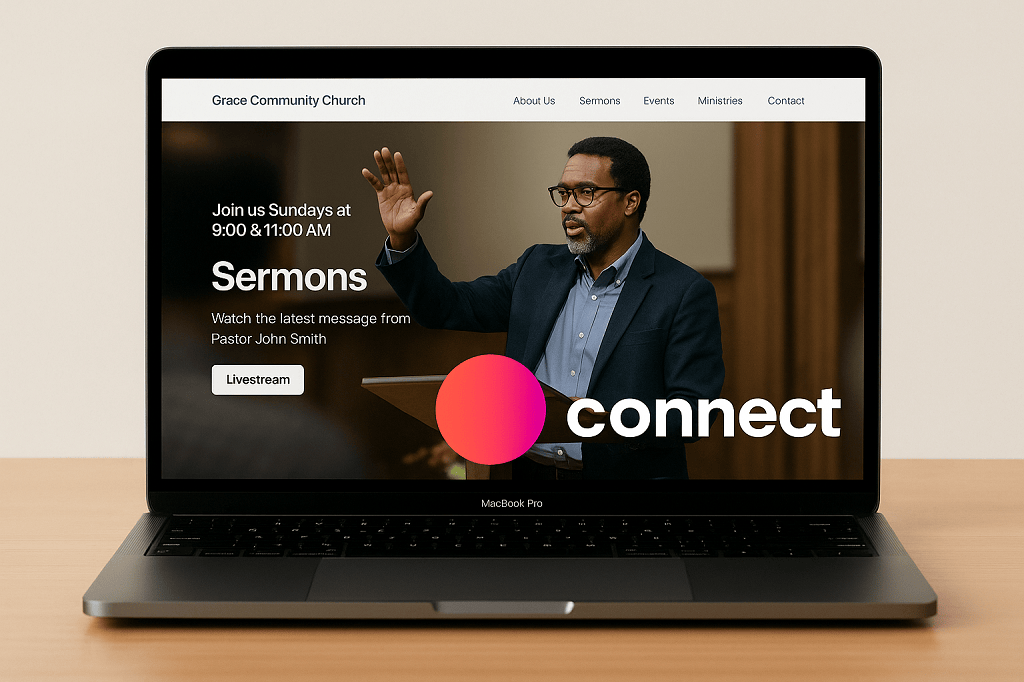
When a parish starts growing, templates begin to feel small. Forms don’t fit, donation limits show up, and customization stops where the builder’s options end. That’s when ministries turn to Scrile Connect — a full-cycle development service for creating digital spaces that belong entirely to them.
Scrile Connect isn’t another plug-and-play builder. It’s a team that designs and develops custom church websites from the ground up, matching each parish’s structure, language, and community goals. Everything — from branding and design to payments and member management — is made to fit the ministry’s rhythm.
Why Churches Choose Scrile Connect
Churches that need more than a template find real flexibility here. Scrile Connect websites include built-in systems for memberships, donations, and private access. Teams get full control over their content, their data, and their communication channels.
Key benefits include:
- Custom membership tiers — define access levels for parishioners, volunteers, or leadership teams.
- Integrated donations — support recurring giving, event-specific fundraisers, or one-time gifts through Stripe, CCBill, or crypto.
- Private community tools — prayer walls, forums, or study groups, all moderated and secure.
- White-label design — the church’s logo and style appear everywhere, never hidden behind another brand.
- Compliant architecture — GDPR-ready, secure authentication, and adult-content filtering for ministries that manage sensitive topics.
How Ministries Use It
Churches use Scrile Connect to create real online homes — not just landing pages. Some focus on membership management, building portals where registered users can access devotionals, announcements, or small-group schedules. Others develop donation dashboards that help track pledges and financial goals transparently. Multi-parish organizations rely on multi-language support to unite diverse congregations.
For large ministries, Scrile Connect scales effortlessly. It connects internal systems like CRM tools, mailing lists, and accounting software while keeping everything under one domain.
That’s what makes it the best church website builder alternative — it gives churches full ownership of their data, their design, and their growth. There are no platform limits, no preset layouts, and no recurring commissions. Just a website built for one purpose: to serve a living community under its own name and faith.
Conclusion
Church websites have become more than digital brochures — they’re the heartbeat of modern ministry. They host announcements, sermons, prayer groups, and donation systems that keep the community connected throughout the week. Every growing parish now needs a digital space that feels genuine and stable, not a template that looks like hundreds of others.
Drag-and-drop tools can be a good starting point, but they quickly run out of room for creativity, scalability, and control. As the congregation expands, so do the technical and organizational needs — from multilingual support to private memberships and donation tracking. That’s where a tailored approach makes all the difference.
Scrile Connect gives ministries the freedom to shape their own digital environment. Every page, payment, and feature reflects the identity of the church — its voice, values, and mission. The team helps clients go beyond what traditional builders can offer, delivering something that truly belongs to the community it serves.
Contact the Scrile Connect team today to start building a website that mirrors your faith, strengthens outreach, and grows with your ministry for years to come.
FAQ
What website builder do churches use?
Most churches depend on software such as Wix, WordPress, Squarespace, and ChurchTrac. Wix is known for drag-and-drop templates, WordPress provides almost unlimited customization with plugins, Squarespace is known for the quality of the designs it includes, and ChurchTrac marries website functionality with member management. Even expanding ministries become frustrated with the limitations of all of these and look to Scrile Connect for customized development that grows with their mission.
How can I create a website for my church?
Start by defining your church’s goals and understanding what kind of experience you want visitors to have. Choose a simple domain name that reflects your identity, then select a builder or a development partner to bring your idea to life. Design the layout around your key sections — sermons, events, donations, and contact information. Once your pages are ready, test how everything looks on mobile, review the details carefully, and publish. Promotion comes next, through newsletters, social media, and your existing congregation.
Is Squarespace good for a church website?
Yes, Squarespace is a solid option for smaller parishes that value style and ease of use. Its donation and event tools make setup quick, but it’s limited in flexibility and integrations. Churches seeking full control over their brand, membership systems, and growth prefer Scrile Connect, which offers a completely customized solution.
Read also
| Article | Why it’s worth reading |
|---|---|
| AI Pastor: Can Artificial Intelligence Preach? | If you work with faith-based communities, this article helps you draw the line between what AI can assist with (guidance, FAQs, content) and what should remain in the hands of real pastors and ministry leaders. |
| Christian AI: How Technology Is Changing Faith in 2026 | This piece gives a broader view of how Christian projects already use AI for teaching, discipleship, and support, and which formats resonate best with believers. |
| AI for Nonprofits in 2026: Boost Fundraising | Once your digital presence is set, fundraising becomes the next challenge. Here you’ll see how AI can segment donors, personalize outreach, and improve campaign performance for any nonprofit. |
| Digital Fundraising Strategy in 2026: Smart Tactics | This article ties everything together into a clear fundraising strategy: which channels to use, how to build funnels, and how to turn digital tools into a predictable revenue stream for your mission. |
